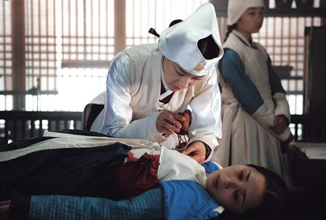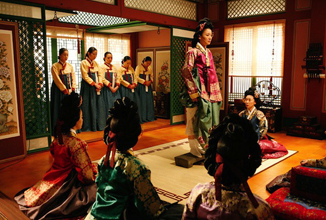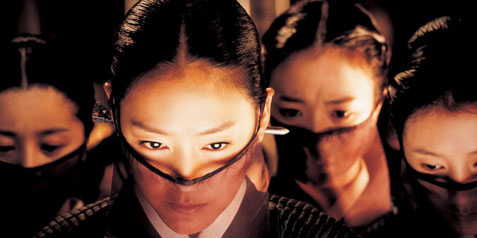"When you entered the palace, you took a vow of marriage to the Royal Court and here you will stay until you die...
If you steal, you will have your hands cut off; if you lie, your tongue will be cut out; and if you take another man into your bed, you will be beheaded..."
Synopsis:
When Wol-reong (Seo Yeong-hee) - maid to one of the king's concubines - is discovered hanged in her room, Royal Court nurse Cheon-reong (Park Jin-hee) is called in to investigate the circumstances surrounding her death.
Within a short space of time, evidence begins to suggest that Wol-reong may in fact have been murdered but on voicing her findings to her superiors Cheol-reong is told in no uncertain terms to record a verdict of suicide and close the case. Refusing to be swayed, Cheol-reong resolves to delve deeper to discover the truth but each answer she finds brings her yet more questions unveiling a far-reaching web of secrets, lies and hypocrisy, in the process.
Body count rising, Cheol-reong soon comes face-to-face with the realisation that her investigation is not only resulting in further deaths but is also putting her own life in serious jeopardy...
Review:
Set during the early 18th century period of the Joseon dynasty, Shadows in the Palace begins six years prior to the main narrative timeline and within the very first scenes - showing a Royal Court maid being strung-up from a gallows during the annual Maid's Ritual and another (whose identity is later revealed) breaking free from her bonds of punishment to wander the forest with the sound of a baby crying ringing in her head - the vicious retribution exacted on perceived female wrongdoers by their, again female, superiors and peers is made abundantly clear.
Short though this early flashback sequence is, its atmospheric and wholely dark depiction nonetheless lingers in the mind and combines with the subsequent deeply layered and twisted tale to deftly underline one of the main narrative themes; that of Joseon era outward propriety, purity, chastity and honour serving as a veil beneath which a far more salacious and sexually wanton underbelly exists; a world only spoken of only in hushed whispers and kept from prying eyes by intricate secrets held in place (certainly in this case) by threats of violent punishment and even fear of death.
While numerous historical Korean thrillers, dramas, horrors and even romances have regularly referenced similar themes and combined them with depictions of classical Korea' patriarchal society, Shadows in the Palace uses a largely female cast to focus on the matriarchy oiling the wheels, if you will, within it even implying to a degree that it is with these women that the true power in the palace lays; albeit in the name of serving the king and ensuring that he is given a male heir.
These ideas too have been seen in Joseon-set film such as The Concubine but the autocratic elements present in Shadows in the Palace are far more visceral, twisted and hard-hitting than most to the extent that on a number of occasions they will likely appear visually shocking to all but the most ardent horror movie fans; all the while maintaining their necessity and the gripping nature of their inclusion, rather than appearing as simply gratuitously violent.
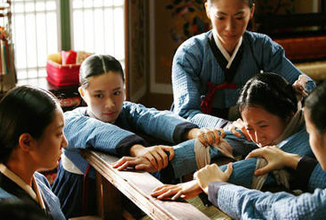 |
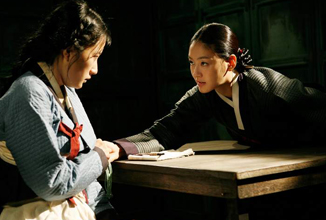 |
And speaking of horror, the addition of several seemingly supernatural, ghostly occurrences throughout Shadows in the Palace allows for it as a whole to traverse the line between mystery thriller, historical drama and horror movie beautifully but though these elements are indeed in keeping with classic horror genre tales, to my mind deeming the film as simply horror is frankly doing it a disservice as a result of the connotations such a blanket generic term invariably brings.
That said, the otherworldly aspects present are, to my mind, the weakest link in the story chain even though director Kim Mi-jeong (whose first solo feature the film was) endeavours to repeatedly raise questions as to whether the ghostly apparitions are truly appearing or if these 'shadows in the palace' are simply the fevered imaginings of troubled, guilt-ridden minds.
As layered as it is intricate, as bleak as it is brutal, Shadows in the Palace is all of the above descriptions and so, so much more but never feels laboured or difficult to follow in any respect; its complexity, in fact, standing as one of its strengths.
With regard to the narrative itself, many films detailing investigations or the unearthing of the truth behind a mystery could be accused of deliberately withholding information to facilitate a climactic story twist but in the case of Shadows in the Palace the decision to set the story within a Royal Court that functions as almost as much a direct result of secrecy as in spite of it belies any noticeable contrivance on that score and, in fact, with secrets being an integral part of each and every character - including Cheol-reong - and plot twist their gradual unveiling feels utterly believable and natural throughout.
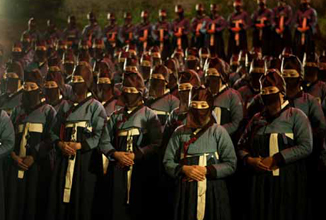 |
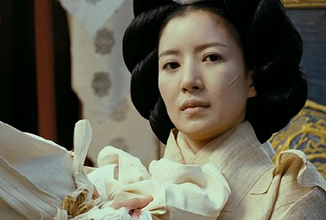 |
A huge amount of credit must be given to director Kim Mi-jeong for not only writing and directing a narrative that successfully reveals individual character information at only the optimum moment, ensuring that each piece of the puzzle impacts on numerous others in the process, but also for creating an intricate web of secrets within secrets, lies within lies; a cavalcade, if you will, of climatic twists and turns that keep the final outcome of events genuinely surprising and continually gripping to the very end.
I've made reference and comparisons to a number of historical fictional Korean films (past and present) throughout the duration of this review and it almost goes without saying that cinematic period pieces of recent years (from Untold Scandal to Portrait of a Beauty to The Servant to The Concubine, etc etc) have increasingly used sexually-graphic visuals to accent their sexually infused tales. As such, and especially considering the fact that sex and sexuality are so inherent to Shadows in the Palace's storyline, it is all the more surprising that explicit imagery plays virtually no part in the depiction and realisation of its narrative themes, and while there is more than one sex scene within the film, no nudity whatsoever is on display at any point.
That decision may initially seem strange and perhaps even counterintuitive but the fact remains that ultimately the total avoidance of graphic visual displays of sexuality and the sexual act actually serves to work in the film's favour; almost allowing sex to be seen as another of the many hidden and dirty secrets so inherent to the character personas, necessary to the storyline and prevalent to the narrative.
As such, it is the visceral darkness and plot intricacies of Shadows in the Palace, rather than deliberately explicit 'titillation', that will dictate individual viewer feelings towards the film and I for one, as a fan of bleak yet intelligent drama, consider Shadows in the Palace a resounding and largely unmissable success.
Cast:
Park Jin-hee,Yoon Seo-ah, Seo Yeong-hee, Lim Jeong-eun
Director:
Kim Mi-jeong
Summary:
As layered as it is intricate, as bleak as it is visceral, Shadows in the Palace is a beautifully complex and intelligent period thriller; a twisted story of secrets, lies, power and hidden sexuality made all the stronger by the avoidance of sexually explicit visual imagery and titillation.
DVD:
The DVD edition reviewed here is the Korean (Region 3) Art Service 2-Disc Limited Edition. The film itself is provided as an anamorphic transfer with an aspect ratio of 1.85:1 and there are no image artifacts (and no ghosting) present. The picture is absolutely exemplary and compliments the visuals perfectly.
The original Korean language soundtrack is provided as Dolby Digital 5.1 and both it and the musical score are well balanced and noticeably nuanced throughout.
Excellent subtitles are provided throughout the main feature but English-speaking viewers should note that, as with many Korean DVD releases, there are no subtitles available on any of the extras.
DVD Extras:
Disc 1
Feature Presentation: Shadows In The Palace
Commentary with Director Kim Mi-jeong and Jung Seung-hye (CEO of Morning Pictures)
Disc 2
Making Of
Arts Direction
Costumes
Visual Effects: Digital Images, Computer Graphics
Poster Shoot
Teaser
Theatrical Trailer
|


